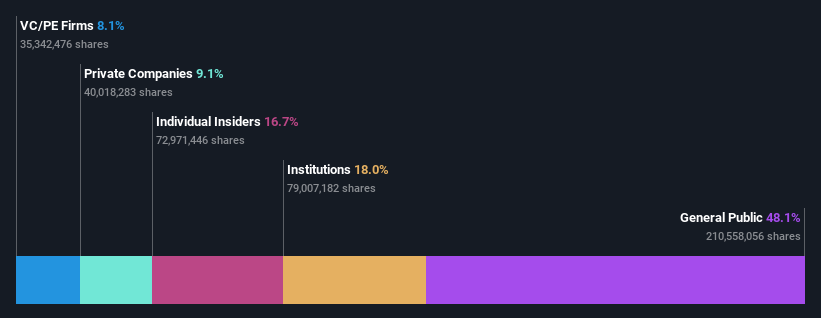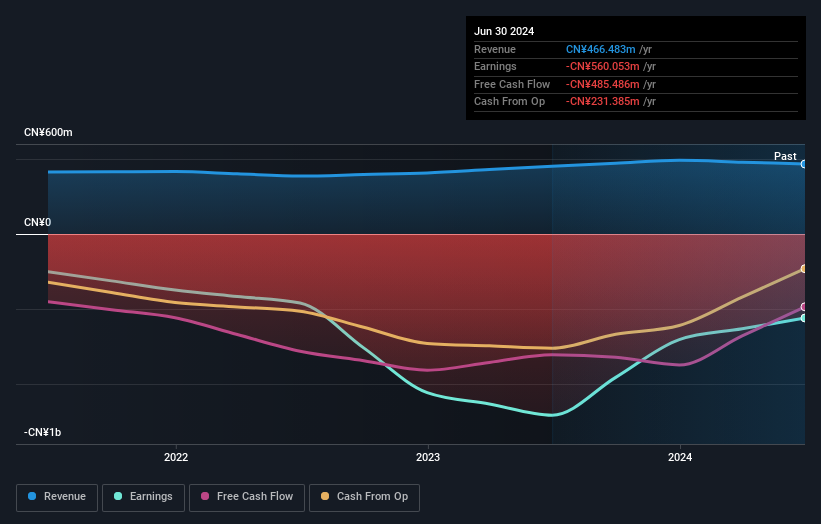Venus Medtech (Hangzhou) Inc.'s (HKG:2500) market cap touched HK$1.5b last week, benefiting both individual investors who own 48% as well as institutions
Key Insights
- Significant control over Venus Medtech (Hangzhou) by individual investors implies that the general public has more power to influence management and governance-related decisions
- 50% of the business is held by the top 15 shareholders
- Insider ownership in Venus Medtech (Hangzhou) is 17%
To get a sense of who is truly in control of Venus Medtech (Hangzhou) Inc. (HKG:2500), it is important to understand the ownership structure of the business. We can see that individual investors own the lion's share in the company with 48% ownership. In other words, the group stands to gain the most (or lose the most) from their investment into the company.
While individual investors were the group that benefitted the most from last week’s HK$613m market cap gain, institutions too had a 18% share in those profits.
In the chart below, we zoom in on the different ownership groups of Venus Medtech (Hangzhou).
View our latest analysis for Venus Medtech (Hangzhou)

What Does The Institutional Ownership Tell Us About Venus Medtech (Hangzhou)?
Institutional investors commonly compare their own returns to the returns of a commonly followed index. So they generally do consider buying larger companies that are included in the relevant benchmark index.
Venus Medtech (Hangzhou) already has institutions on the share registry. Indeed, they own a respectable stake in the company. This can indicate that the company has a certain degree of credibility in the investment community. However, it is best to be wary of relying on the supposed validation that comes with institutional investors. They too, get it wrong sometimes. It is not uncommon to see a big share price drop if two large institutional investors try to sell out of a stock at the same time. So it is worth checking the past earnings trajectory of Venus Medtech (Hangzhou), (below). Of course, keep in mind that there are other factors to consider, too.

Hedge funds don't have many shares in Venus Medtech (Hangzhou). Looking at our data, we can see that the largest shareholder is Ming zhi investments limited with 9.1% of shares outstanding. With 8.8% and 8.1% of the shares outstanding respectively, Zhenjun Zi and DCP Investments are the second and third largest shareholders.
After doing some more digging, we found that the top 15 have the combined ownership of 50% in the company, suggesting that no single shareholder has significant control over the company.
Researching institutional ownership is a good way to gauge and filter a stock's expected performance. The same can be achieved by studying analyst sentiments. As far as we can tell there isn't analyst coverage of the company, so it is probably flying under the radar.
Insider Ownership Of Venus Medtech (Hangzhou)
The definition of an insider can differ slightly between different countries, but members of the board of directors always count. The company management answer to the board and the latter should represent the interests of shareholders. Notably, sometimes top-level managers are on the board themselves.
I generally consider insider ownership to be a good thing. However, on some occasions it makes it more difficult for other shareholders to hold the board accountable for decisions.
Our most recent data indicates that insiders own a reasonable proportion of Venus Medtech (Hangzhou) Inc.. Insiders have a HK$242m stake in this HK$1.5b business. This may suggest that the founders still own a lot of shares. You can click here to see if they have been buying or selling.
General Public Ownership
With a 48% ownership, the general public, mostly comprising of individual investors, have some degree of sway over Venus Medtech (Hangzhou). While this size of ownership may not be enough to sway a policy decision in their favour, they can still make a collective impact on company policies.
Private Equity Ownership
With an ownership of 8.1%, private equity firms are in a position to play a role in shaping corporate strategy with a focus on value creation. Some might like this, because private equity are sometimes activists who hold management accountable. But other times, private equity is selling out, having taking the company public.
Private Company Ownership
We can see that Private Companies own 9.1%, of the shares on issue. Private companies may be related parties. Sometimes insiders have an interest in a public company through a holding in a private company, rather than in their own capacity as an individual. While it's hard to draw any broad stroke conclusions, it is worth noting as an area for further research.
Next Steps:
While it is well worth considering the different groups that own a company, there are other factors that are even more important. Take risks for example - Venus Medtech (Hangzhou) has 3 warning signs we think you should be aware of.
Of course this may not be the best stock to buy. So take a peek at this free free list of interesting companies.
NB: Figures in this article are calculated using data from the last twelve months, which refer to the 12-month period ending on the last date of the month the financial statement is dated. This may not be consistent with full year annual report figures.
Have feedback on this article? Concerned about the content? Get in touch with us directly. Alternatively, email editorial-team (at) simplywallst.com.
This article by Simply Wall St is general in nature. We provide commentary based on historical data and analyst forecasts only using an unbiased methodology and our articles are not intended to be financial advice. It does not constitute a recommendation to buy or sell any stock, and does not take account of your objectives, or your financial situation. We aim to bring you long-term focused analysis driven by fundamental data. Note that our analysis may not factor in the latest price-sensitive company announcements or qualitative material. Simply Wall St has no position in any stocks mentioned.
Contact Us
Contact Number : +852 3852 8500Service Email : service@webull.hkBusiness Cooperation : marketinghk@webull.hkWebull Securities Limited is licensed with the Securities and Futures Commission of Hong Kong (CE No. BNG700) for carrying out Type 1 License for Dealing in Securities, Type 2 License for Dealing in Futures Contracts and Type 4 License for Advising on Securities.

English